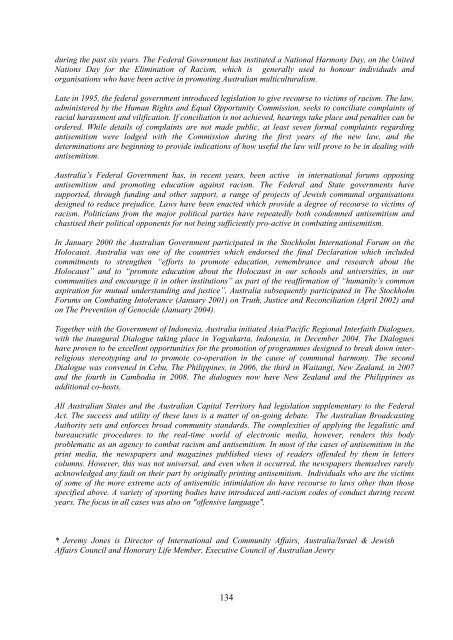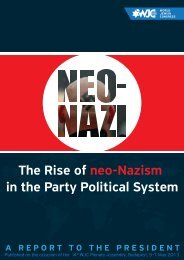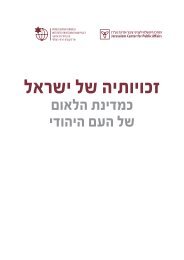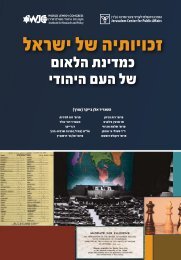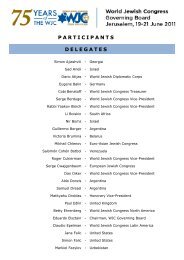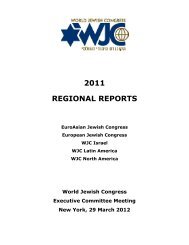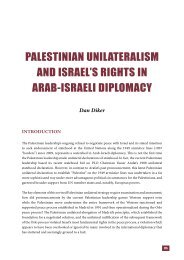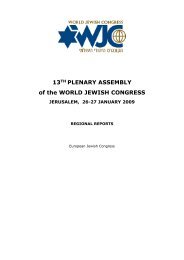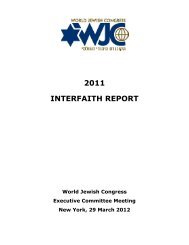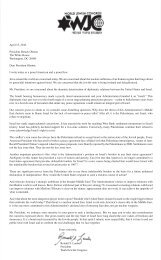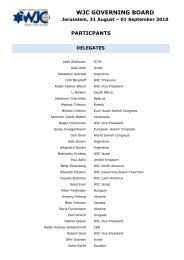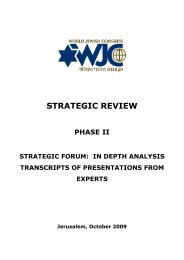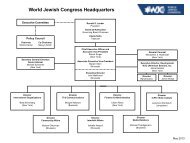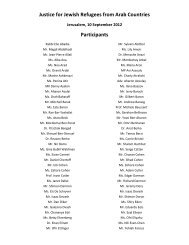Antisemitism Report 2009 - World Jewish Congress
Antisemitism Report 2009 - World Jewish Congress
Antisemitism Report 2009 - World Jewish Congress
You also want an ePaper? Increase the reach of your titles
YUMPU automatically turns print PDFs into web optimized ePapers that Google loves.
during the past six years. The Federal Government has instituted a National Harmony Day, on the United<br />
Nations Day for the Elimination of Racism, which is generally used to honour individuals and<br />
organisations who have been active in promoting Australian multiculturalism.<br />
Late in 1995, the federal government introduced legislation to give recourse to victims of racism. The law,<br />
administered by the Human Rights and Equal Opportunity Commission, seeks to conciliate complaints of<br />
racial harassment and vilification. If conciliation is not achieved, hearings take place and penalties can be<br />
ordered. While details of complaints are not made public, at least seven formal complaints regarding<br />
antisemitism were lodged with the Commission during the first years of the new law, and the<br />
determinations are beginning to provide indications of how useful the law will prove to be in dealing with<br />
antisemitism.<br />
Australia’s Federal Government has, in recent years, been active in international forums opposing<br />
antisemitism and promoting education against racism. The Federal and State governments have<br />
supported, through funding and other support, a range of projects of <strong>Jewish</strong> communal organisations<br />
designed to reduce prejudice. Laws have been enacted which provide a degree of recourse to victims of<br />
racism. Politicians from the major political parties have repeatedly both condemned antisemitism and<br />
chastised their political opponents for not being sufficiently pro-active in combating antisemitism.<br />
In January 2000 the Australian Government participated in the Stockholm International Forum on the<br />
Holocaust. Australia was one of the countries which endorsed the final Declaration which included<br />
commitments to strengthen ―efforts to promote education, remembrance and research about the<br />
Holocaust‖ and to ―promote education about the Holocaust in our schools and universities, in our<br />
communities and encourage it in other institutions‖ as part of the reaffirmation of ―humanity’s common<br />
aspiration for mutual understanding and justice‖. Australia subsequently participated in The Stockholm<br />
Forums on Combating Intolerance (January 2001) on Truth, Justice and Reconciliation (April 2002) and<br />
on The Prevention of Genocide (January 2004).<br />
Together with the Government of Indonesia, Australia initiated Asia/Pacific Regional Interfaith Dialogues,<br />
with the inaugural Dialogue taking place in Yogyakarta, Indonesia, in December 2004. The Dialogues<br />
have proven to be excellent opportunities for the promotion of programmes designed to break down interreligious<br />
stereotyping and to promote co-operation in the cause of communal harmony. The second<br />
Dialogue was convened in Cebu, The Philippines, in 2006, the third in Waitangi, New Zealand, in 2007<br />
and the fourth in Cambodia in 2008. The dialogues now have New Zealand and the Philippines as<br />
additional co-hosts.<br />
All Australian States and the Australian Capital Territory had legislation supplementary to the Federal<br />
Act. The success and utility of these laws is a matter of on-going debate. The Australian Broadcasting<br />
Authority sets and enforces broad community standards. The complexities of applying the legalistic and<br />
bureaucratic procedures to the real-time world of electronic media, however, renders this body<br />
problematic as an agency to combat racism and antisemitism. In most of the cases of antisemitism in the<br />
print media, the newspapers and magazines published views of readers offended by them in letters<br />
columns. However, this was not universal, and even when it occurred, the newspapers themselves rarely<br />
acknowledged any fault on their part by originally printing antisemitism. Individuals who are the victims<br />
of some of the more extreme acts of antisemitic intimidation do have recourse to laws other than those<br />
specified above. A variety of sporting bodies have introduced anti-racism codes of conduct during recent<br />
years. The focus in all cases was also on "offensive language".<br />
* Jeremy Jones is Director of International and Community Affairs, Australia/Israel & <strong>Jewish</strong><br />
Affairs Council and Honorary Life Member, Executive Council of Australian Jewry<br />
134


